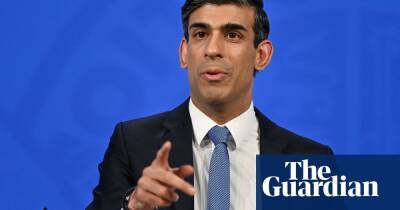UK reports first budget surplus in Covid crisis despite rising inflation
The UK government has recorded the first monthly budget surplus since the start of the coronavirus pandemic, despite a weaker than expected January performance as rising inflation pushed up debt interest costs.
The Office for National Statistics said public sector net borrowing was in surplus of £2.9bn last month – the first month in which income outstripped expenditure since January 2020.
January is typically a net positive month for the public finances because of the timing of self-assessed income tax payments. Borrowing last month was £5.4bn less than in January 2021, when the third national lockdown affected the UK economy.
Despite the return to the black, the surplus was still smaller than that recorded in January 2020 before the onset of Covid-19. City economists had also forecast a bigger boost for the public finances of £3.5bn.
The figures come as rising inflation pushes up the government’s debt servicing costs, fuelled by a surge in the retail prices index to which index-linked gilts are pegged. The ONS said accrued interest payments on central government debt were £6.1bn in January, the highest for that month since records began in April 1997.
Alongside rising inflationary pressure, the record rise in government borrowing during the pandemic has pushed up the stock of national debt to levels unseen since the early 1960s. The ONS said the national debt – the total amount owed by the state accumulated over the years – was £2.3tn, or about 94.9% of gross domestic product (GDP).
Rishi Sunak said the rise in the national debt and higher rates of inflation were putting additional pressure on the public finances. “Keeping the public finances on a sustainable path is crucial so we can continue helping the British people when
Read more on theguardian.com



















